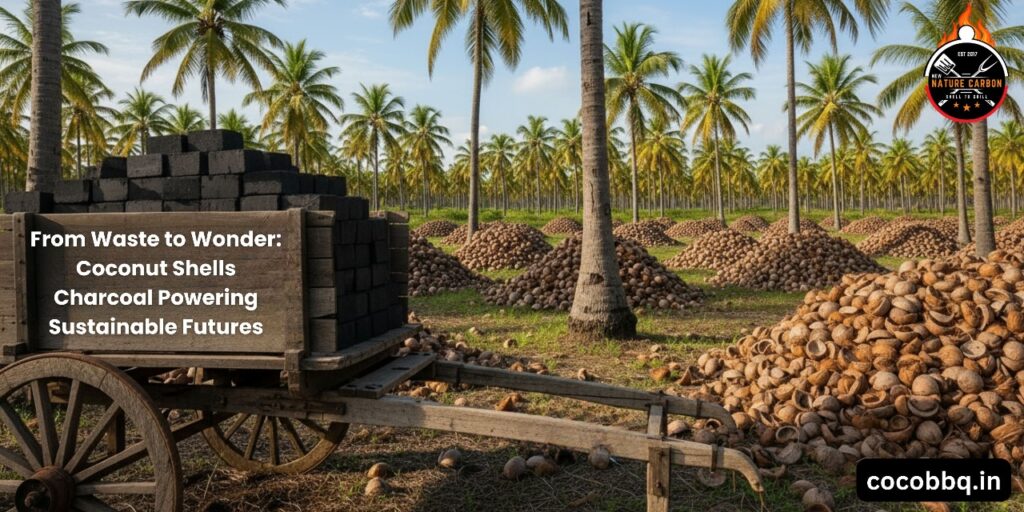In today’s world, where sustainability has moved from a trend to a necessity, every industry is looking for smarter and greener solutions. Among the many eco-friendly innovations, one stands out both for its simplicity and impact Coconut Shells Charcoal. What was once discarded as agricultural waste has now turned into a powerful resource for cooking, heating, and even industrial use.
This remarkable transformation is not just about finding an alternative fuel; it’s about redefining the way we think of waste and energy.
The Journey from Waste to Wonder
Coconut shells, often left unused after extracting the fruit’s flesh and water, used to pile up as waste. In tropical regions where coconuts are abundant, this posed a significant environmental concern. But innovators and communities discovered something unique: when processed properly, these shells could be turned into high-quality charcoal.
Benefits of using coconut shells for charcoal:
- Renewable byproduct of coconut farming.
- Reduces agricultural waste and environmental pollution.
- Provides a clean, sustainable alternative to wood charcoal.
- Supports local communities through processing and production.
Why Coconut Shells Charcoal Stands Out
There are several reasons why chefs, households, and industries are shifting to this eco-friendly fuel:
- Cleaner Burning: Produces far less smoke than wood or coal.
- Longer Heat Retention: Burns hotter and longer for efficient cooking.
- Sustainable & Renewable: Consistent supply from coconuts grown year-round.
- Lower Carbon Footprint: Helps reduce deforestation and environmental damage.
- Cost-Effective: A practical and affordable alternative for households and restaurants.
For restaurants, especially BBQ and grill-focused ones, this means not just better-tasting food but also a responsible choice that customers increasingly value

Coconut Shells Charcoal in Food & BBQ
One of the most exciting applications of Coconut Shell Charcoal is in food preparation. Anyone who has enjoyed a charcoal-grilled dish knows the difference smoky aroma, enhanced flavor, and a natural crispness that gas or electric grills simply cannot provide.
Why chefs and diners love it:
- Provides steady, even heat for perfect grilling.
- Enhances the smoky flavor of meats, seafood, and vegetables.
- Eco-conscious choice for sustainability-minded customers.
- Ideal for BBQ, tandoor, and open-flame cooking styles.
Restaurants across Asia, the Middle East, and Europe are increasingly adopting coconut shell briquettes for their grills. It’s a trend that aligns taste with responsibility.
A Global Solution for Sustainable Living
The use of coconut shells for fuel extends beyond the food industry:
- Rural households: Affordable and accessible cooking fuel.
- Urban restaurants & cafés: Promotes a green identity.
- Industrial applications: Activated carbon from coconut shells used for water purification and metallurgy.
- Global impact: Reduces waste, promotes renewable energy, and supports circular economy practices.

Building a Greener Future Together
The story of coconut shells reminds us of an important lesson: sustainability doesn’t always require new resources sometimes it’s about reimagining what we already have.
Why adopting coconut shells charcoal matters:
- Reduces agricultural and industrial waste.
- Cuts down carbon emissions and deforestation.
- Creates employment opportunities in rural areas.
- Promotes a circular economy model.
The Final Flame
From waste piles on coconut farms to powering kitchens and restaurants worldwide, Coconut Shell Charcoal is a true symbol of sustainability in action. It proves that innovation and responsibility can go hand in hand, delivering both flavor and a cleaner planet.
As more people, businesses, and communities embrace this renewable resource, the world moves one step closer to a greener, more resilient future. Indeed, coconut shells are no longer just agricultural leftovers they are the sparks of a sustainable tomorrow.

